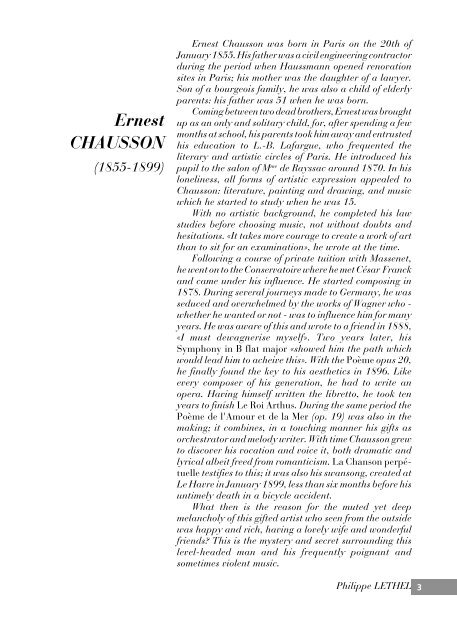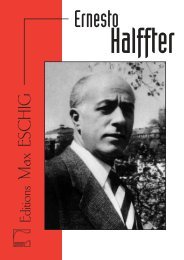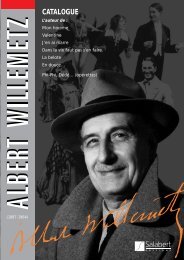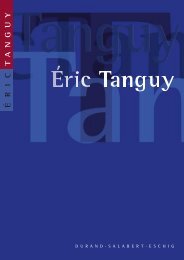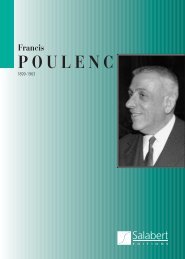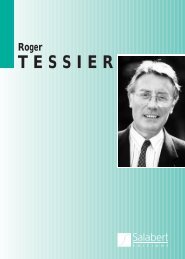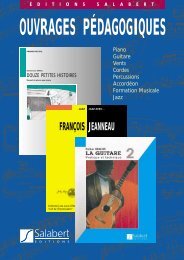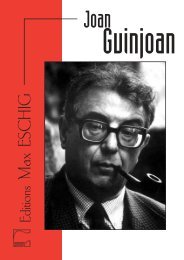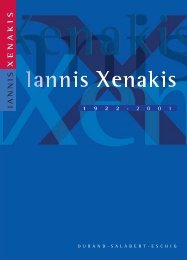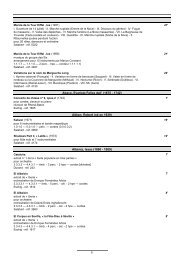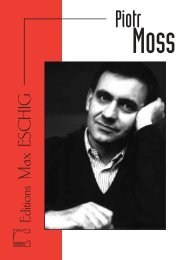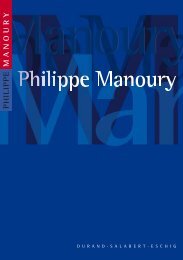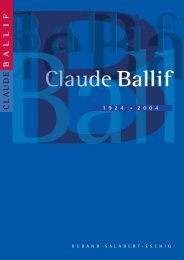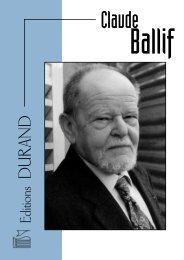Ernest CHAUSSON - durand-salabert-eschig
Ernest CHAUSSON - durand-salabert-eschig
Ernest CHAUSSON - durand-salabert-eschig
You also want an ePaper? Increase the reach of your titles
YUMPU automatically turns print PDFs into web optimized ePapers that Google loves.
<strong>Ernest</strong><br />
<strong>CHAUSSON</strong><br />
(1855-1899)<br />
<strong>Ernest</strong> Chausson was born in Paris on the 20th of<br />
January 1855. His father was a civil engineering contractor<br />
during the period when Haussmann opened renovation<br />
sites in Paris; his mother was the daughter of a lawyer.<br />
Son of a bourgeois family, he was also a child of elderly<br />
parents: his father was 51 when he was born.<br />
Coming between two dead brothers, <strong>Ernest</strong> was brought<br />
up as an only and solitary child, for, after spending a few<br />
months at school, his parents took him away and entrusted<br />
his education to L.-B. Lafargue, who frequented the<br />
literary and artistic circles of Paris. He introduced his<br />
pupil to the salon of M me de Rayssac around 1870. In his<br />
loneliness, all forms of artistic expression appealed to<br />
Chausson: literature, painting and drawing, and music<br />
which he started to study when he was 15.<br />
With no artistic background, he completed his law<br />
studies before choosing music, not without doubts and<br />
hesitations. «It takes more courage to create a work of art<br />
than to sit for an examination», he wrote at the time.<br />
Following a course of private tuition with Massenet,<br />
he went on to the Conservatoire where he met César Franck<br />
and came under his influence. He started composing in<br />
1878. During several journeys made to Germany, he was<br />
seduced and overwhelmed by the works of Wagner who -<br />
whether he wanted or not - was to influence him for many<br />
years. He was aware of this and wrote to a friend in 1888,<br />
«I must dewagnerise myself». Two years later, his<br />
Symphony in B flat major «showed him the path which<br />
would lead him to acheive this». With the Poème opus 20,<br />
he finally found the key to his aesthetics in 1896. Like<br />
every composer of his generation, he had to write an<br />
opera. Having himself written the libretto, he took ten<br />
years to finish Le Roi Arthus. During the same period the<br />
Poème de l'Amour et de la Mer (op. 19) was also in the<br />
making; it combines, in a touching manner his gifts as<br />
orchestrator and melody writer. With time Chausson grew<br />
to discover his vocation and voice it, both dramatic and<br />
lyrical albeit freed from romanticism. La Chanson perpétuelle<br />
testifies to this; it was also his swansong, created at<br />
Le Havre in January 1899, less than six months before his<br />
untimely death in a bicycle accident.<br />
What then is the reason for the muted yet deep<br />
melancholy of this gifted artist who seen from the outside<br />
was happy and rich, having a lovely wife and wonderful<br />
friends? This is the mystery and secret surrounding this<br />
level-headed man and his frequently poignant and<br />
sometimes violent music.<br />
Philippe LETHEL 3


